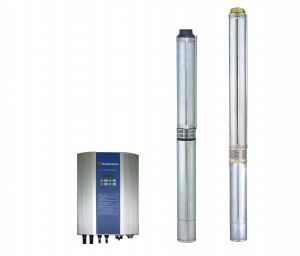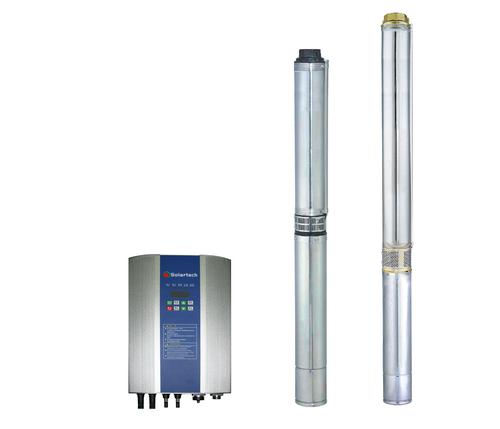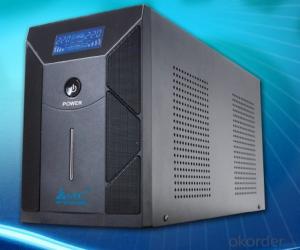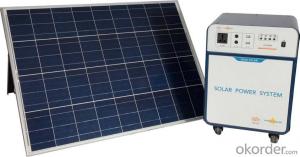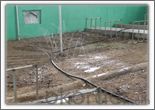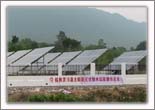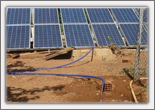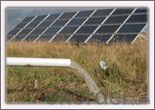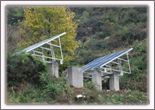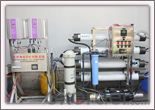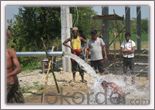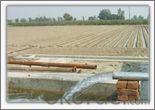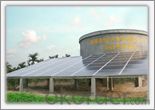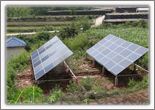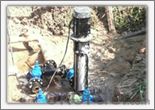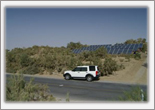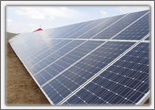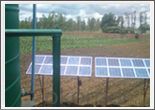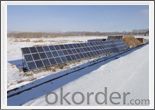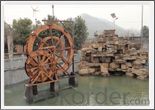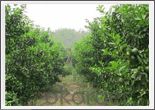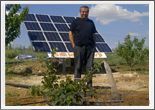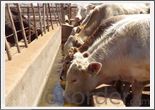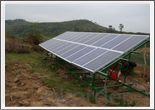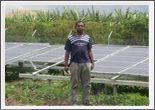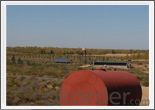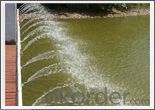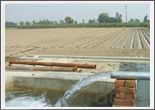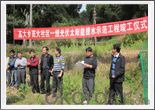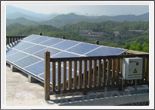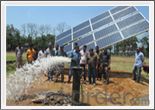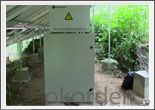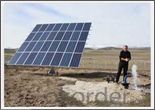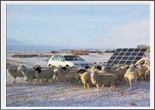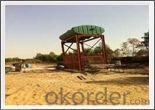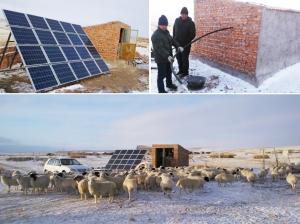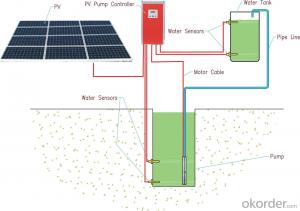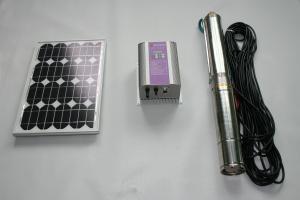Solar Energy Systems Calgary - Solar Pumping Inverter for Solar Water Pumping System
- Loading Port:
- Shekou
- Payment Terms:
- TT or LC
- Min Order Qty:
- 20 unit
- Supply Capability:
- 800000 unit/month
OKorder Service Pledge
OKorder Financial Service
You Might Also Like
Products
Solar Inverter Introduction:
Solar pumping inverter converts DC current from the solar array into AC current to drive the pump. With the function of MPPT (maximum power point tracking), it regulates the output frequency according to irradiation in real time to achieve the maximum power.
Solar Inverters Features:
1. Adopting the proposed dynamic VI maximum power point tracking (MPPT) control method; Fast response and stable operation; Better than the conventional methods which may lead to the problems including poor tracking performances, unstable or even cause water hammer damaging when the irradiation on the array changes rapidly.
2. The solar pumping inverters system is dispensed with energy storing devices, and stores water instead of electricity. It improves the reliability of the device, at the same time, it lowers the construction and maintenance costs of the system dramatically.
3. Digital control; automatic operation and data acquisition/storage of 8 years, etc; 98% of conversion efficiency, and complete protection.
4. In-line blocks; user friendly; convenient for operating; perfect cooling and shielding.
Technical Features
Solar Pumping Inverter Advantages:
1. To drive pumps equipped with 3-phase induction motors.
2. Optimized SPWM.
3. Various operation modes and MPPT algorithms are available.
4. Adjustable speed range of pump based on the actual situation of the system.
5. Available option of water-level detecting and control circuit.
6. Protection functions: lightning, over/low input voltage, over current and over load protection, etc.
7. Enclosure class: IP52.
8. Ambient temperature:-10~+50˚C.
Poduct Specifications
Model | Maximum input dc voltage | Recommended MPP Voltage | Rated Output Current | Output Voltage | Output Frequency | Net Weight | Gross Weight | Package Size | ||
Length | Width | Height | ||||||||
PB400L | 450 | 280-350 | 3 | 3PH 220V | 0-50 | 3.4 | 4.9 | 320 | 280 | 225 |
PB750L | 450 | 280-350 | 5 | 3PH 220V | 0-50 | 3.4 | 4.9 | 320 | 280 | 225 |
PF750L | 450 | 150-350 | 5 | 3PH 220V | 0-60 | 6.1 | 7.1 | 425 | 325 | 250 |
PB1500L | 450 | 280-350 | 7 | 3PH 220V | 0-50 | 4.0 | 5.6 | 355 | 280 | 225 |
PF1500L | 450 | 150-350 | 7 | 3PH 220V | 0-60 | 7.5 | 8.5 | 425 | 325 | 285 |
PB2200L | 450 | 280-350 | 11 | 3PH 220V | 0-50 | 4.0 | 5.6 | 355 | 280 | 225 |
PF2200L | 450 | 150-350 | 11 | 3PH 220V | 0-60 | 7.9 | 9.0 | 425 | 325 | 285 |
PB3700LA | 450 | 280-350 | 17 | 3PH 220V | 0-50 | 7.2 | 9.5 | 425 | 325 | 285 |
PB5500LA | 450 | 280-350 | 25 | 3PH 220V | 0-50 | 7.3 | 9.6 | 425 | 325 | 285 |
PB3700H | 750 | 500-600 | 9 | 3PH 380V | 0-50 | 7.2 | 9.5 | 425 | 325 | 285 |
PB5500H | 750 | 500-600 | 13 | 3PH 380V | 0-50 | 7.3 | 9.6 | 425 | 325 | 285 |
PB7500H | 750 | 500-600 | 18 | 3PH 380V | 0-50 | 7.7 | 10 | 425 | 325 | 285 |
PB11KH | 750 | 500-600 | 24 | 3PH 380V | 0-50 | 8.2 | 10.5 | 425 | 325 | 285 |
PB15KH | 750 | 500-600 | 30 | 3PH 380V | 0-50 | 8.4 | 10.7 | 425 | 325 | 285 |
PB18KH | 750 | 500-600 | 39 | 3PH 380V | 0-50 | 8.4 | 10.7 | 425 | 325 | 285 |
PB22KH | 750 | 500-600 | 45 | 3PH 380V | 0-50 | 18 | 21 | 600 | 465 | 350 |
PB30KH | 750 | 500-600 | 60 | 3PH 380V | 0-50 | 18 | 21 | 600 | 465 | 350 |
PB37KH | 750 | 500-600 | 75 | 3PH 380V | 0-50 | 20 | 23 | 600 | 465 | 350 |
PB45KH | 750 | 500-600 | 91 | 3PH 380V | 0-50 | 20 | 23 | 600 | 465 | 350 |
PB55KH | 750 | 500-600 | 112 | 3PH 380V | 0-50 | 20 | 23 | 600 | 465 | 350 |
Success Stories
►Middle East ►NaQu ►GuiLin
►Turkey ►XiNing ►YunNan
►Army stationed island ►Bangladesh ►Pakistan
►HaiNan ►HuBei ►Uganda
►XinJiang ►NingXia ►Afghan
►Zimbabwe ►Inner Mongolia ►Zhejiang
►Guangxi Guilin ►Turkey2 ►Botswana
►Naning ►Uganda ►Shaanxi
►Tsinghua University ►Pakistan ►Yunnan2
►FuJian ►Banqladesh ►YunNan3
►Turkey ►Inner Mongolia ►Senegal
- Q: Can a solar energy system be used in areas with high humidity?
- Indeed, areas with high humidity can make use of a solar energy system. Although high humidity can have an impact on the functionality of a solar energy system to some degree, contemporary solar panels are engineered to endure diverse weather conditions, including high humidity. While the efficiency of solar panels may slightly decline in the presence of high humidity due to the moisture in the air, it is not a substantial factor that would render solar energy systems inefficient. Moreover, adequately maintaining and cleaning the panels can alleviate any possible problems caused by humidity. In conclusion, areas with high humidity can still effectively employ solar energy systems.
- Q: Are solar energy systems suitable for residential properties?
- Yes, solar energy systems are suitable for residential properties. They can efficiently generate electricity and provide homeowners with a clean and renewable energy source. Additionally, solar panels can be installed on rooftops, maximizing space utilization. With advancements in technology, solar energy systems have become more affordable, making them a viable option for residential properties.
- Q: Can solar energy systems be used in areas with high wind speeds?
- Yes, solar energy systems can still be used in areas with high wind speeds. While wind can potentially affect the efficiency of solar panels by causing them to vibrate or reducing the amount of sunlight they receive, proper installation techniques and design considerations can mitigate these issues. Additionally, combining solar and wind energy systems can create a hybrid solution that maximizes renewable energy generation in such areas.
- Q: Can solar energy systems be used in powering religious institutions like churches or temples?
- Yes, solar energy systems can definitely be used to power religious institutions like churches or temples. Solar panels can be installed on the rooftops or surrounding areas of these buildings to harness sunlight and convert it into electricity. This renewable energy source can help reduce the carbon footprint of these institutions, lower their energy costs, and serve as a sustainable and environmentally-friendly solution for their power needs.
- Q: What are the benefits of installing a solar energy system?
- Installing a solar energy system comes with numerous benefits that make it a compelling choice for individuals, businesses, and communities. First and foremost, solar energy is a renewable and sustainable source of power. Unlike fossil fuels, which are finite and contribute to environmental degradation, solar energy harnesses the power of the sun, which will continue to shine for billions of years. One of the key advantages of solar energy is its ability to reduce electricity bills. By generating your own electricity, you can significantly lower or even eliminate your reliance on grid power, resulting in substantial savings over time. Moreover, solar panels have a long lifespan, typically lasting 25 to 30 years, meaning you can enjoy these cost savings for decades. Not only does solar energy save money, but it also provides a stable and predictable energy cost. As utility prices fluctuate due to various factors, solar energy allows you to lock in your electricity costs and protect yourself from future price increases. This stability can be particularly beneficial for businesses and organizations that need to manage their budgets effectively. Installing a solar energy system also helps to reduce carbon emissions and combat climate change. Solar power is a clean and green energy source that produces no greenhouse gases or air pollutants during operation. By transitioning to solar energy, you can decrease your carbon footprint and contribute to a cleaner and healthier environment for future generations. Furthermore, solar energy systems require minimal maintenance. Once installed, solar panels generally require only occasional cleaning and inspections, making them a hassle-free and low-maintenance energy solution. They also provide energy independence, allowing you to generate your own power and become less reliant on external energy sources. In addition to these benefits, installing solar energy systems can also lead to job creation and economic growth. The solar industry has been rapidly expanding, creating new employment opportunities and contributing to local economies. Investing in solar energy not only benefits the environment but also stimulates economic development and supports the growth of a sustainable and resilient energy sector. Overall, the benefits of installing a solar energy system are vast and multi-faceted. From cost savings and energy independence to environmental sustainability and job creation, solar power offers a compelling solution for a brighter and more sustainable future.
- Q: Can a solar energy system be installed in areas with extreme weather conditions?
- Indeed, solar energy systems have the capability of being installed in regions that experience severe weather conditions. These systems are specifically constructed to endure a broad spectrum of weather phenomena, including extreme cold, heat, wind, rain, and snow. In fact, solar panels are frequently utilized in diverse areas with intense weather conditions, such as deserts, arctic regions, and coastal zones. To guarantee the sturdiness and effectiveness of the system, solar panels are constructed using top-notch materials that possess the ability to withstand adverse weather conditions. They are designed to be resistant to impact and undergo rigorous testing to ensure they can endure hail, strong winds, and heavy snow loads. Furthermore, the frames and mounting systems employed for solar panels are engineered to provide stability and protection against extreme weather events. Even in frigid weather conditions, solar energy systems can still function efficiently, although their performance may be slightly affected by the lower temperatures. Solar panels are specifically designed to absorb sunlight, enabling them to generate electricity even under low-light circumstances. In snowy areas, solar panels are typically installed at an angle to facilitate the shedding of snow and prevent accumulation that could reduce their efficiency. In regions with scorching heat, solar energy systems can still operate effectively, albeit with a slight reduction in panel efficiency due to elevated temperatures. Nevertheless, contemporary solar panels are equipped with heat dissipation features to minimize any performance losses caused by high temperatures. In summary, solar energy systems possess remarkable adaptability and can be successfully installed in areas that experience extreme weather conditions. They are designed to withstand a wide range of weather elements, ensuring the generation of clean and renewable energy persists even in challenging environments.
- Q: Can solar energy systems be used for powering recycling or waste management facilities?
- Certainly, recycling or waste management facilities can utilize solar energy systems for power. The facilities can install solar panels on their rooftops or open spaces to capture sunlight and convert it into electricity. This renewable energy can then be used to operate various equipment within the facility, such as sorting machines, conveyor belts, compactors, shredders, and more. The utilization of solar energy in recycling or waste management facilities offers several benefits. Firstly, it reduces reliance on conventional energy sources like fossil fuels, which are not only costly but also contribute to environmental pollution and climate change. Solar energy, in contrast, is abundant, free, and sustainable in the long run. Additionally, solar energy systems have minimal maintenance requirements due to the absence of moving parts in solar panels and their ability to withstand harsh weather conditions. As a result, they are highly reliable and suitable for continuous operations in recycling or waste management facilities. Another advantage of using solar energy in these facilities is the ability to offset electricity costs associated with heavy machinery usage. Given the high energy demands of recycling and waste management processes, utilizing solar power can significantly reduce electricity bills and lead to long-term cost savings. Moreover, solar energy is environmentally friendly, emitting no greenhouse gases or air pollutants during operation. This aligns perfectly with the objectives of recycling and waste management facilities, which strive to minimize environmental impact and promote sustainable practices. By harnessing solar energy, these facilities can further decrease their carbon footprint and contribute to a greener, more sustainable future. In conclusion, solar energy systems can effectively power recycling or waste management facilities, offering numerous advantages such as reduced dependence on conventional energy sources, cost savings, low maintenance requirements, and environmental sustainability. With the continuous advancements and affordability of solar technology, it is expected that solar energy will play an even greater role in powering these facilities in the future.
- Q: Can a solar energy system be installed on a green roof?
- Yes, a solar energy system can be installed on a green roof. In fact, combining solar panels with a green roof can have several benefits. A green roof provides insulation, reduces stormwater runoff, and helps mitigate the urban heat island effect. By installing solar panels on a green roof, the panels can benefit from the cooling effect of the vegetation, resulting in improved energy production and efficiency. Additionally, the green roof can provide shade to the solar panels, reducing the risk of overheating and extending their lifespan. It is important to ensure that the structural integrity of the roof can support both the weight of the green roof and the solar panels, and proper installation and maintenance are crucial to ensure the success and longevity of the system.
- Q: How do solar energy systems impact water resources?
- Solar energy systems have a positive impact on water resources as they do not require water for their operation, unlike traditional power plants that rely on large amounts of water for cooling. This reduces the strain on water supplies and helps conserve this valuable resource. Additionally, solar energy systems can be used to power water treatment and desalination plants, contributing to the availability of clean drinking water in areas with limited access to fresh water sources.
- Q: Are there any risks of electrical hazards during installation or maintenance of solar energy systems?
- Yes, there are risks of electrical hazards during the installation or maintenance of solar energy systems. Solar energy systems involve working with high-voltage DC (direct current) electricity, which can pose dangers if not handled properly. Some of the potential risks include: 1. Electrocution: Solar panels generate electricity, and if not isolated or disconnected properly, there is a risk of electrocution for individuals working on the system. 2. Fire Hazards: Faulty wiring, loose connections, or improper installation can lead to electrical arcs and sparks, which can ignite a fire if proper precautions are not taken. 3. Falls and Injuries: Solar panels are typically installed on rooftops, which may involve climbing ladders, working at heights, and handling heavy equipment. If not done with caution, it can result in slips, falls, or injuries. 4. Arc Flash: When working on live electrical equipment, there is a risk of arc flash, which is a sudden release of energy that can cause severe burns, hearing damage, and even death. 5. Environmental Risks: While not directly related to electrical hazards, it is essential to consider potential environmental risks during the installation of solar energy systems. For instance, improper disposal of hazardous materials used in solar panels, such as lead, cadmium, or other toxic substances, can harm the environment if not handled correctly. To mitigate these risks, it is crucial to follow proper safety protocols and guidelines during the installation and maintenance of solar energy systems. This includes wearing personal protective equipment (PPE), ensuring proper grounding and isolation procedures, using insulated tools, and following all local electrical codes and regulations. It is also recommended to hire trained and certified professionals for the installation and maintenance to minimize the risks associated with electrical hazards.
Send your message to us
Solar Energy Systems Calgary - Solar Pumping Inverter for Solar Water Pumping System
- Loading Port:
- Shekou
- Payment Terms:
- TT or LC
- Min Order Qty:
- 20 unit
- Supply Capability:
- 800000 unit/month
OKorder Service Pledge
OKorder Financial Service
Similar products
Hot products
Hot Searches
Related keywords
